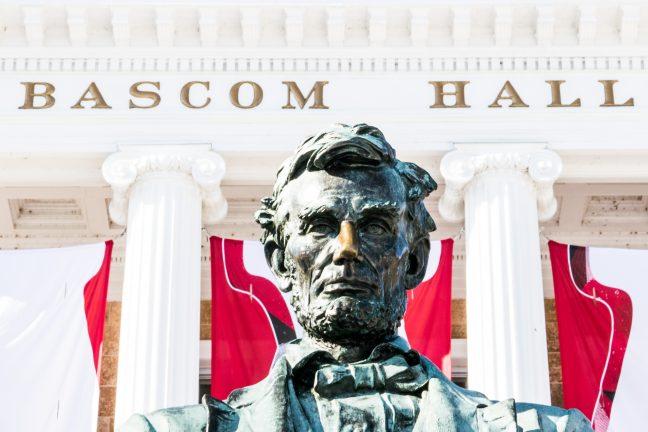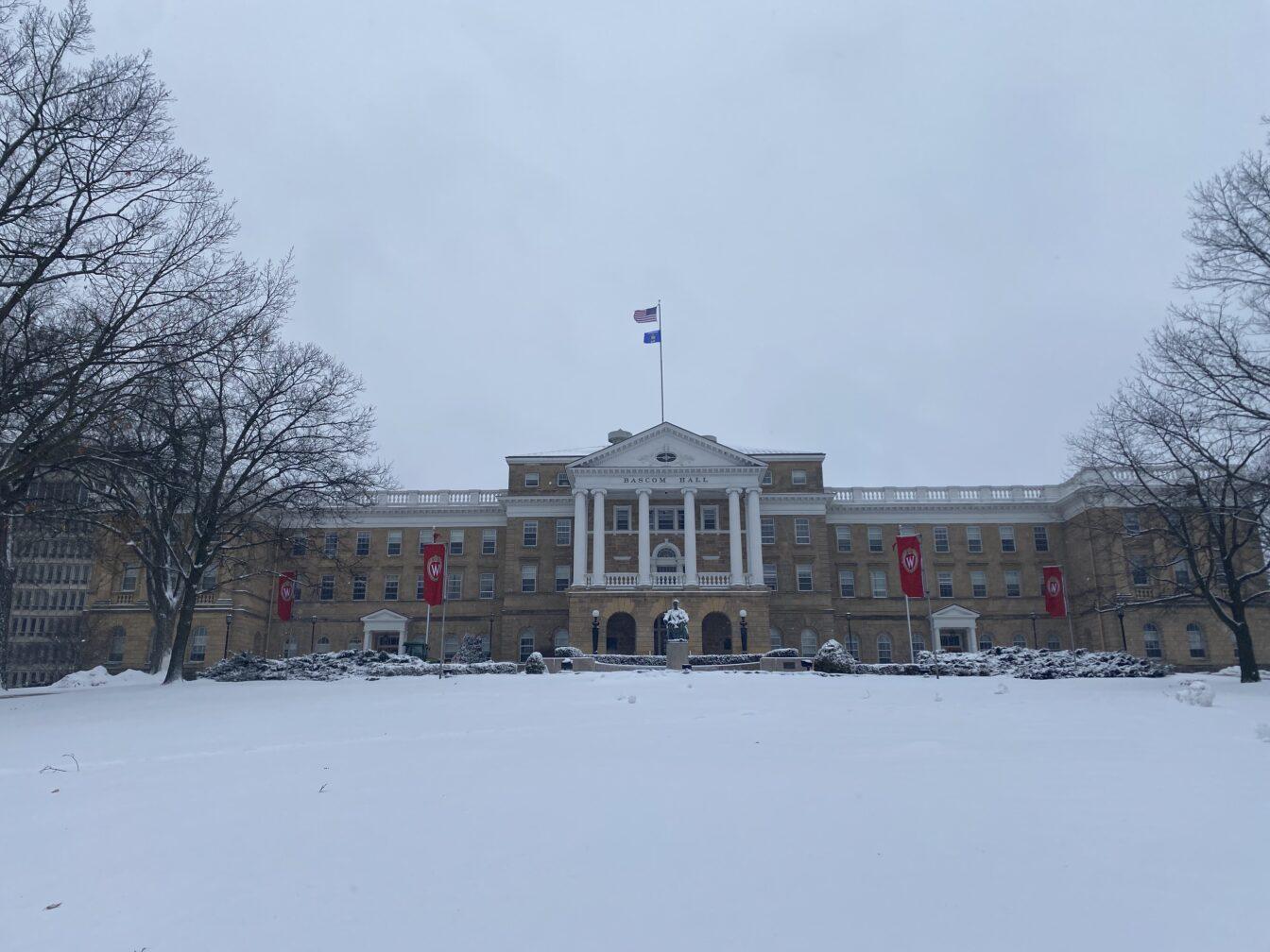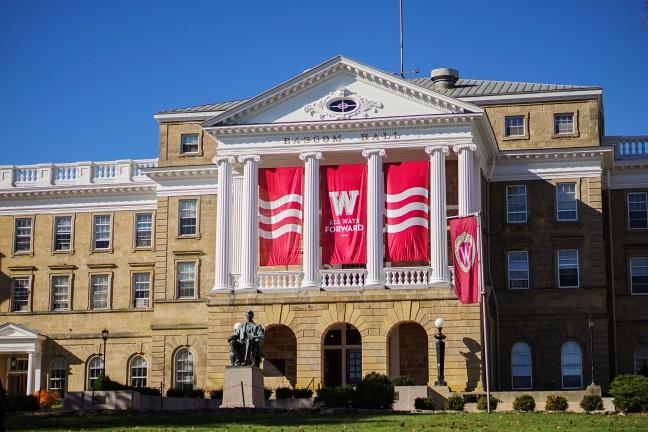While striving to be a voice for students at University of Wisconsin, The Badger Herald Editorial Board works to direct student attention at important ongoing issues within the city, campus and state. In reviewing the past semester, we decided to hand out a few awards.
Quid Pro Woah Award: Former state superintendent hopefuls Lowell Holtz and John Humphries
This year’s state superintendent race reminded us you don’t need to look further than Wisconsin for a truly WTF election – alleged quid pro quo, teeth whitening and “massive power grabs,” this one had it all.
The only statewide election on the spring ballot, this year’s ostensibly nonpartisan superintendent race pitted Democrat-backed two-term incumbent Tony Evers against political newcomer, newfound conservative and actual goofy goober Lowell Holtz.
But before Holtz was crowned the Republican pick to take on Evers head-to-head, his fellow conservative challenger John Humphries kicked off the cycle’s scandalous shenanigans when reports surfaced he had accepted a $300 in-kind campaign donation in the form of teeth whitening. This prompted the Democratic Party to file the race’s inaugural ethics complaint.
Not one to let Humphries have all the morally ambiguous fun, Holtz joined the fray as he and Humphries were implicated in an apparent backroom deal in which one would drop out of the race in exchange for a six-figure taxpayer-funded job at the Department of Public Instruction. What’s more, the position in question was to be created with the authority to conglomerate and break up local school districts; the exchange explicitly listed taking over at least four of Wisconsin’s more urban school districts. Not to worry though, the pair assured the public the plan was neither of their ideas, rather it was the brainchild of businessmen they refused to name.
Cue another ethics complaint, this time from liberal group One Wisconsin Now.
The dynamic duo of Humphries and Holtz followed up the bribery allegations with a truly fantastic encore – releasing dueling documents trying to pin blame on the other. At this point, Evers took a break from watching his opponents implode long enough to call the proposed position’s powers to combine and dismantle local districts “a massive power grab.”
But wait, there’s more!
The ethical trouble didn’t stop for Holtz as, five days before the election, Whitnall School Board sent a letter to parents informing them Holtz may have misused district resources to launch his political career while he was Whitnall School District superintendent.
Let’s just go ahead and count that little number as another ethics complaint.
For all its hype and intrigue, the race ended anti-climactically with Evers coasting to a third term with 70 percent of the vote … but it sure was fun while it lasted.
For showing the state just how ethically questionable people will get to be in charge of children’s education, we award Humphries and Holtz the Quid Pro Woah Award.
Oppression Olympics Award: ASM Divestment Debate
Nothing says “welcome back to school after your spring break on a beach somewhere” quite like a heated six-hour-long student government meeting.
A resolution drafted by Associated Students of Madison in collaboration with Students for Justice in Palestine requesting the University of Wisconsin divest from companies allegedly complicit in human rights violations, sparked heated debate both within ASM and across campus as a result of it’s inclusion of Israeli companies. The resolution proposed centered on private prisons, arms manufacturers, the Dakota Access Pipeline and Israeli settlements in Palestine.
On March 29, after the original resolution was introduced, both supporters and critics of the resolution engaged in a six-hour-long open forum that began as an intellectual debate on divestment and quickly disintegrated into UW’s first annual Oppression Olympics Games. Many Jewish students spoke to perceived similarities of the resolution to the Boycott, Divestment, Sanction movement, while members of SJP, Wunk Sheek, MEChA and the Black Student Union pressed council members to consider their concerns as marginalized students.
ASM unanimously approves contentious divestment proposal to mixed reactions from campus
Throughout the evening, open forum became an emotional, accusatory battle of minorities. Speakers from both sides demonstrated an utter lack of respect and empathy for one another, visibly silencing each other’s struggles and manipulating what started as legislation about global human rights into an opportunity to debate the Israeli-Palestinian conflict.
This exceedingly complex geopolitical struggle cannot be compressed into one ASM Council meeting, nor solved by one resolution.
What we can do as students is listen to one another. What we can do is refuse to minimize each other’s struggles by amplifying our own.
Resorting to ad hominem attacks, laughing and jeering during another student’s time at the podium and neglecting to even read legislation before making an informed decision is not working for us. One thing is certain: the divestment conversation is not over. And unless you all want to read a dozen more op-eds shaming fellow students as anti-Semites and racists, we had better be prepared to treat each other with more respect when the time comes.
Anti-Semitism is real. Anti-blackness is real. Indigenous erasure is real. Palestinian struggle is real. If you care about one, you should care about all, and recognize that pitting these struggles against each other benefits nobody and damages everybody.
There is no gold medal here. See you in four years said no one, ever.
For its devolvement into petty and unproductive dialogue, we award the ASM divestment debate the coveted Oppression Olympics Gold Medal.
Just Shut Up Award: UW Study Body
Things are not going well when your university’s chancellor, faced with a room full of students expressing their fears and grief regarding the growing presence of the “alt-right” on campus, blurts out “Well, you can pretty much stand on Bascom Hill and scream whatever you want.”
College students across the map have made national headlines throughout the 2016-17 school year on the subject of free speech, an issue UW students have gotten extremely intimate with time and again.
Neither the university nor the majority of the student body seems to have a strong hold on the distinction between free speech and hate speech, the latter of which some of the particularly ignorant — and Republican legislators — somehow manage to deny completely. Perhaps we can shed some light on the matter.
If your right to freedom compels you to speak out in advocacy of hatred, of violence, of ethnic cleansing, of rape, sir, that is hate speech. The only reason you’d have trouble swallowing this pill is if your identity comes with such immense privilege — and you are vehemently opposed to educating yourself on this privilege — that you fail to understand the often fatal implications of what, to you, is only words.
President Donald Trump, as far as we know, has never laid a violent hand on a Latinx, black or Muslim person. But the freedom of speech that protected him as he navigated the campaign trail, spewing lies about the violent tendencies of minority populations, fertilized American ground ripe with hate crimes, division and even murder.
Conservative pundit Ben Shapiro lectures to turbulent crowd on safe spaces, freedom of speech
From the attempted formation of a UW “alt-right” group, to the invitation of conservative pundit Ben Shapiro from Young Americans for Liberty, to bitter discourse and frustration surrounding a column berating Islam, to ASM’s divestment proposal, students have engaged in furious, often misguided, debate on the limits of free speech. Somehow, the university still lacks any hate speech policy, and all “offensive” speech is safeguarded under the free speech umbrella.
Chancellor: protecting the First Amendment is crucial for our campus and our nation. But so is protecting the livelihood of the marginalized and the disenfranchised, often the subject of slander from the mouths of the hateful who veil their animosity and bigotry under a feeble cloth of freedom.
Fraternities who sing about sexual assault should be shut down, and cowards advocating a political ideology calling for ethnic cleansing can hide in YouTube comments, but they will not be tolerated on Bascom. Maybe by you, but sure as hell not by us. For that, UW’s free speech policy receives the Just Shut Up award.
Ray of Sunshine Award: Madison Municipal Government
It’s only May and yet the federal government has almost shut down, the Wisconsin state Legislature has accomplished next to nothing and Mark Zuckerberg has already started his 2020 campaign. Amid this chaos of government shines one small beacon of hope: local government.
In February, the Madison City Council unanimously passed a resolution that condemned President Donald Trump’s travel ban (read: Muslim ban), and reaffirmed Madison’s status as a welcoming place for all. The approved resolution denotes city libraries and the City County Building as “safe spaces” within Madison.
Resolution creates safe spaces at City-County Building, Madison libraries
While the jury is still officially out on whether or not Madison is actually a “sanctuary city,” everyone in city government seems to be on the same page. The mayor, city council and police chief actually all agree it’s not worth the city’s time or resources to (unjustly) profile individuals for minor offenses that could ultimately lead to deportation.
MPD has said it “will not arrest or detain any person solely for a suspected violation of immigration laws.”
Madison Mayor Paul Soglin echoed a similar (and very direct) sentiment during a January news conference.
“We are not going to operate on anything other than our Constitution and our own good will,” Soglin said. “The position of the city of Madison will not change.”
Madison leaders call new immigration executive order unconstitutional
It’s a big deal when branches of the city government actually agree on something, so if this doesn’t get the point across, nothing will; and that point is just one big “fuck you” to the Trump administration and the state legislators who relentlessly.
While municipal government can often be overlooked and/or dismissed as insignificant, this stance on the matter of sanctuary cities is anything but. After nearly 100,000 Madisonians marched in opposition to the Trump presidency following inauguration, the bright light of optimism gleaning from the city was nearly blinding.
For doubling down on its sanctuary city status while under a stupid amount of pressure from various levels of government, we award the city of Madison the Ray of Sunshine award.
The Better on Paper Award: Gov. Scott Walker
When you ask current and past students why they chose to attend the University of Wisconsin, you’d more than likely get a variety of answers.
Some would certainly mention the party scene, athletics or even campus aesthetics. But it’s almost a guarantee every student who chose to attend UW did so because they knew its reputation for academic excellence. The vast majority of the students, faculty and staff here are well aware of our academic reputation and we all work hard to maintain it. Unfortunately, we have a governor who’s making that a pretty hard thing to do.
Our excellence comes from more than 150 years of the state and UW working together to educate and enrich students from around the state, country and world. We know for UW to thrive and produce world-class research, future leaders and productive members of society, this university and its sister schools need money.
Walker’s budget proposal decreases in-state tuition, raises student concerns
Gov. Scott Walker’s latest budget called for $135 million more in funding, which seemed lovely at face value. But the governor’s proposal didn’t come without some foolish caveats. This included allowing for students to opt out of important segregated fees as well as a tuition cut for in-state students. Again, while the tuition cut might seem like a really great idea at face value, we know it isn’t.
Since 2012, hundreds of millions in state funding have been cut from the UW System. Even with the $135 million suggested in Walker’s new budget, the UW System would still remain significantly underfunded. Adding a tuition cut essentially ensures its academic status will continue to drop as more faculty leave and staff leave for greener pastures.
If Wisconsinites value education, in 2018 they will pick a candidate who cares about our world-class universities.
For his convenient but still ultimately lackluster “support” for the UW System, we award Walker the Better on Paper Award.
Badger Herald Editorial Board: See the tuition cut for what it is – a thinly veiled cheap shot













